- Home
- Joy Dettman
Diamonds in the Mud and Other Stories Page 5
Diamonds in the Mud and Other Stories Read online
Page 5
‘It’s good material. You’ll grow into it.’ Ugly words to justify a cheap and ugly purchase.
Grey drill shorts for the boys, vanilla essence and bootlaces, the children excited as they watched their pile of merchandise grow. Then it was done. The hawker tallied the price in his head. It matched to a penny the notes and coins the woman had counted grudgingly from her purse onto the space between the china cups and the green dress.
And her arm knocked a cup. Was it accidental, or a desire to destroy? Did she hope to barely chip it, to be forced to possess something of beauty?
Her girl swooped, caught the cup bare inches above the hard baked clay and held it to her breast as she might have held a fragile bird, her eyes big, filled with wonder.
The woman reached for it, wiped dusty fingermarks away with the corner of her apron, then one ragged fingernail traced the pattern of flowers as her small finger curved away from the others in memory of tea parties and other fine china cups. She sighed, placed it down beside the green dress, loaded her children with her ugly purchases, pocketed her purse and walked away.
‘Don’t you go hanging about here all day either. And make sure you close that gate behind you.’
The words flung over her shoulder to the Indian belonged to her mother-in-law, high, nasal. Today, she understood why that old woman had whined.
The Khaki Flannel Dress
Flood, devastation, loss of life and possessions. I read the newspaper headlines this morning and feel the years sliding away. My eyes then seek the faces of the small flood victims who, in photographs, stand behind defeated parents. It’s there as I know it will be there, that merry glint of mischief in their eyes, excitement veiled by a hand.
I smile then, as memories flow back in delicious waves of childhood guilt. To me, the word flood once meant holiday time at Nanny’s house. I recall little of my mother’s heartbreak or of lost possessions – though I once lost a khaki flannel dress to floodwaters.
What age was I – nine, ten? Certainly old enough to loathe that particular frock with its white lacy baby bib, its belt and long sleeves. A winter dress of pure woollen flannel, it itched. My neck, my waist, my inner elbows, beneath my arms, behind my knees that dress tormented me. It seemed to haunt several years of my childhood – until that first year when we were not quite washed from the family home.
During that era, we owned a private river bank, lived on home-grown fruit, milk and freedom in a ramshackle farmhouse – great expectations having found my dad attempting to scrape a living from pigs, cows and chickens.
The house was big enough. Its lounge room, saved for cold wintry nights and visitors, boasted a large, log-sized, open fireplace. The kitchen, long and light, was separated from the lounge room by a wide lobby, a cool place to sit and read. The bedrooms were small and dark.
We had no bathroom, but a large tin tub in the washhouse shed sufficed. A hazy place, that shed. Smell of wood-smoke and boiling soap suds in an ancient copper, of green Palmolive soap and flyspray. It was red-back spider heaven, we didn’t linger in that bath where fangs were poised and ever ready to strike at one’s bareness as we stepped from that old tin tub.
The river was swollen. There had been good rains upstream, but the property had previously belonged to my great grandfather. Dad knew its history. ‘This land hasn’t been flooded in fifty years,’ he repeated each night while he listened to the news on a large cabinet wireless. ‘The house is on high ground,’ he said each morning when he checked the stake planted in the mud of the river bank. But each evening a little more of the stake had been swallowed up by the river.
‘Have any of you kids been moving this stake?’ He made excuses to the end, but we were innocent, at least in our actions.
The pigsties were on the highest land. They were safe. The cows were moved into the front paddock adjacent to the road, ready for a quick getaway, and the doors of the henhouse flung wide. It was every hen for herself now.
Then the clothesline prop floated away in the night and Mum couldn’t hang the baby’s napkins. She always had a baby. One wailer would stop his wailing and grow teeth and a new one would start up.
‘I don’t know why your bloody grandfather didn’t build the house in the south paddock,’ Dad said, hooking up a temporary line between the veranda posts.
When the hens took to the trees, Mum, a pretty gentle creature, baby on her hip, toddler entwined around her knee, advised, ‘If I were you, love, I’d be thinking of putting a levy around the house.’
Dad stood in the doorway eyeing her and her hens as prophets of doom. ‘Bloody water,’ he muttered. ‘Bloody river. Why did the crazy old coot buy land on the low side of the bloody river?’
He and my older brother constructed a small sandbag levy, too late. The river had bolted, and while Dad pulled out the last of his hair I, the middle-sized middle-man, hid my smile while willing the water higher. I loved Nanny’s house.
It was a stealthy, sneaking, creeping flood that first year, only ever daring to move forward when Dad’s back was turned. Then came the morning when I awoke to an unaccustomed hollow silence, and to the strange odour of . . . fish? In the semi dark, I stepped down from my bed. How could I ever forget that miraculous dawn? It was better than waking up on Christmas morning to presents on my bed. It was better than a whole bag of lollies I didn’t have to share, better than a dozen sticks of coloured plasticine, still undefiled by a small brother’s hand. It was a triple header chocolate, vanilla and strawberry ice-cream cone, topped with a whole banana. I was in Utopia. Four inches of water carpeted the bedroom floor!
I stood there, nightgown held high, absorbing the shadowy picture of my loathed khaki frock. No longer fit for church, it had been relegated to school dress, so now I had to wear it not for two itchy hours once a week, but for six hours of torment each day. It was hanging where I’d left it, over the foot of my black cast iron bed. Not so my school shoes. They’d joined in the fun, floated into a corner, but the dress, smug with self approval, still hung high and dry.
Only a child can loathe with such fiendish glee that she can poke at a frock until it gives up the battle and falls, floats, sleeves flailing. Mercilessly, I stomped them, sank them, then kicked the soggy khaki beneath my bed. I paddled then, delighting in my secret knowledge while the family slept.
That old house, a split-level, of many splits and few levels, had been built sixty years before split-level houses became fashionable. The lounge room and my parents’ room were still well above the high water line. The kitchen was going under, southern end first, but already the lobby and two back bedrooms were four inches deep.
Later, dressing before the open fire in the lounge room, my younger brother and I giggled hysterically when the kettle, placed there to boil, tilted and poured its water over the previously dry floor. Firewood, already wet, spluttered and laboured on, while Mum attempted to nurse an infant, cook breakfast for Dad and prevent a toddler drowning in a lobby he’d claimed as his playground only the day before.
I remember the delight of no kitchen table and chair that morning, of a bowl of hot porridge delivered into cold hands, held against my chest while I paddled the drowning rooms behind my paddling father and three older siblings, who’d been roped in to assist. Beds were stripped and ticking mattresses and blankets tossed into the lounge room. Bricks and wooden blocks were found to prop the beds up high, before wardrobes and chests of drawers were piled onto the beds. Did I hear Dad mutter, ‘Drown ’em all,’ when a baby protested its own hurried tossing onto a pile of mattresses while Mum ran to save the toddler, who’d nosedived into a passage, now canal, connecting the eastern ocean to the west?
Discoveries of great importance are often made by accident. Who would have thought that the opening and closing of a bedroom door could create ocean waves against the opposite wall? It did.
‘Get to bloody school or I’ll have one less mouth to feed tonight.’ Dad’s temper was growing warmer as his bare blue feet grew colder.
‘Mummy said I don’t have to go to school, that no one has to go because we can’t get out, and my shoes are all wet.’
He won. He usually did. My shoes were retrieved, wiped dry enough – but not my khaki school dress.
‘What if everyone gets drowned while I’m at school, Mummy. What if the water comes up to the windows and the house floats away?’
‘I hope it does,’ the harassed woman replied, pushing a cheese sandwich at me as my father slung me under one arm, transported me to high ground and dumped me there.
I had a mile and a half walk to school. The world was a safer place then, or it seemed a safer place. My parents were at home and would be there to ferry me across the water when I returned from school. They’d told me so.
Nanny lived close to town. She came that afternoon with her offer of beds for the duration, but Dad was an independent coot with a healthy grudge against his mother-in-law, who delighted in saying, ‘I told him so.’
‘It’s going down,’ he replied to her offer. ‘We’ve got the bedroom and the lounge above the water line. We’ll stay put.’
Being the middle-man is an advantage. In large families, middlemen become invisible. I delighted in those first days of the flood and spent more time than necessary paddling. I paddled the bedrooms, the kitchen, paddled often to the lavatory to count the spiders multiplying daily there. Had they previously lived beneath that plank seat? Had they migrated up via that circular hole where bare bottoms perched? And what of the lavatory pit below? A smooth sheet of water now covered it. How could a child forget the daring experience of sitting upon that throne. Faith in the universal law of gravity lent me confidence.
The water peaked an inch below the lounge room floor, but the inadequacies of the old house were made obvious. The front bedroom, presumed to be level with the lounge room, had an inch of water in its western corner. The front veranda and kitchen were only just awash, but until the flood receded, we cooked, ate and slept in the lounge room. An overhead tank supplied fresh water for drinking and the large, flat bottomed bathtub which had formerly lived in the washhouse was set up on the veranda for foot washing and laundry. No baths that week – or was it two? No dirt to play in. Nowhere to play.
My imagination ran rampant. Already captivated by poetry and the image of stately Spanish galleons coming from the isthmus, that tin tub became my obsession. As the days passed, bored by the flood’s restrictions, I ached to test my galleon.
Eventually the sun came out to start the drying process and, as slowly as it had risen, the floodwaters backed away. Dad and my big brother were studying fence damage, Mum had reclaimed her kitchen sink, the older girls were somewhere, the toddler and baby sleeping – which left me and my younger brother to amuse ourselves.
Already there was a smell about the land, the stench of rotten grass and sour mud, of dying fish trapped in stagnant pools. Soon those pools would be gone. Soon that bathtub would be returned to the laundry. This could well be my last chance
‘Come on, Friday. We have to get these apes and ivory across the tropics to the calm green shores,’ I said, determined to prove my theory that what looks like a boat must surely float like a boat.
We dragged the tub to the edge of the veranda where I held it steady while my brother settled into the bow. Then, using Mum’s second best straw broom for an oar, I climbed aboard and confidently pushed off from a veranda post.
Of ballast and water displacement I knew nothing. We tilted, then sank in the slimy ooze – or the tin tub sank, along with my little brother. The water wasn’t deep. I retrieved him. Dad retrieved the tub later. I wasn’t popular, but for one brief moment, I had captained my stately Spanish galleon across my private isthmus.
If I close my eyes now, I can still see us, and feel the momentary euphoria of sun and warmth and the unstable craft. Oh, for the lost magic of childhood, when the world was the way you believed it to be, a safe enough place, even when surviving on the island of a lounge room.
I remember the inches of green slimy mud in flooded bedrooms and Dad attacking it with a flat bottomed shovel, tossing it out the open door. The aged linoleum had disintegrated. It came away in wads and lumps of greenish browns, with the occasional brilliant blue peering out from beneath the slime. There was something muddy, spongy, distinctively fabric amid the ooze, but I chose not to recognise it.
Buckets of water were poured onto the floors and swept out through the door, then came the phenyl and scrubbing brush and the tears, as my untiring mother scrubbed. Disintegrating plastered walls opened tiny tunnels between rooms and the stain of the high water mark defied Mum’s good old elbow grease.
Finances didn’t stretch to new linoleum that year, which was just as well; the following year was even more fun. Mum had our bags packed and ready as I urged those waters higher. She moved us in with Nanny before we were surrounded, leaving Dad and the house to sink or swim alone.
We loved Nanny’s house with its lawns and its white picket fence, and my small brother and I learned to say as tartly as she, ‘We told him so.’
Again the water went down. Again Mum returned. Again she scrubbed, and once again Dad assured her, ‘It will never happen again.’
The following year, he was proven right, but the year after?
‘We told him so, didn’t we, Nanny?’
Scattered Cinders
He worked alone, and he liked it that way. He was twenty-seven; had he claimed to be forty, few would have questioned his word. Not many in town looked him in the eye; they preferred to converse with his shirt buttons. He knew what they said about him. Money coming out of his ears, why doesn’t he rebuild the house and do something about that face?
He was planning to rebuild. Just couldn’t decide where to do it. The charred ruins of the old place had long been cleared away, and it was the only logical site on which to rebuild, but he couldn’t do it, couldn’t cover that piece of earth. Maybe one day. Maybe one day he’d think about covering up some of his scars too, though he’d had enough of hospitals to last him a lifetime.
‘Not much else we can do today bar sit, Fred,’ he said to the black kelpie. The rain had come yesterday. He was hoping it would stick around for a week.
Marlene Marshall would be wishing it to hell. She was getting married today at four. He’d received an invitation, as had half the town, and if only to shut Uncle Norm and Aunt Beth up, he’d sent an acceptance. He wouldn’t be going, though. Marlene wouldn’t miss his presence – as long as he dropped off a present.
‘Maybe we ought to drive into town this morning, Fred, restock the freezers and buy her something.’
Fred grinned his assent and began the long process of getting his arthritic hips into a standing position. He still enjoyed a good sniff around town, but Ben remained seated, his gaze roaming the shed, his and Fred’s living quarters since he’d come home from the hospital and Fred, still a young larrikin, had come home from Uncle Norm’s place.
His gaze settled a moment on a photograph of his parents. It wasn’t much of a shot, taken by the local newspaper when they’d won their last ballroom dancing championship. He glanced at an enlarged snapshot of his sister Katie. Young Danni Marshall had been her best mate at school. She’d taken that shot at a school camp, Katie the tomboy in hiking gear. Katie laughing – the way he needed to remember her. The house had gone up like matchwood. He’d dragged his parents out, but too late for his father. He hadn’t been able to get to Katie. He’d tried. Christ, how he’d tried.
No maudlin thoughts today, mate, old Fred panted, prodding his knee. On your feet, mate.
Ben stood, clicked his fingers, picked up his keys and wallet and they walked through the rain to his red ute. Bought second hand for his eighteenth birthday, it had seen better days, but it still got him to town when he was forced to go there.
He drove past the football ground – in its heyday, his old ute had spent a lot of time parked out there. Anglican church on the corner. It didn’t remind him of Jesus
and the resurrection, only resurrected memories of the funerals he hadn’t attended. They’d buried Katie and his father while he was in that city hospital. Two years later, when his mother gave up the fight, he’d become the scar – Ben Beastly, as he knew a few of the town kids whispered. His hand rose to rub at his left eyebrow, then down the ridged flesh to his jaw.
The bride’s mother had enclosed a gift list with the invitation. Toaster was on it, but she’d underlined Set of copper based stainless steel saucepans. The Kmart sold copper based saucepans – for a hundred and eighty dollars. He’d never taken to Marlene, didn’t like the bloke she was marrying and couldn’t stand her dragon of a mother. He chose a toaster for twenty-nine dollars.
Funny, folks’ eyes – the way they stared at him until he turned to face them, giving them a better view. Funny watching those eyes whip down to his shirt.
‘Good morning, Ben. A nice bit of rain.’
Ben found a sheet of wrapping paper, selected a card and a roll of sticky tape, stood in a queue for ten minutes, scared the tripe out of the check-out girl when she looked up to say, ‘Have a good day,’ and made a kid drop an ice cream when he walked back to his ute, where he and Fred did a semi professional sticky-tape job and signed the card.
The Marshall house was barely a block from the Kmart. He drove around there and sighted young Danni, standing beneath the meagre shelter of a carport, tinkering with the motor of a Holden even more ancient than his own. Ben tucked the toaster beneath his jacket and ran down the drive.
‘Give this to Marlene for me, will you, Marshall? Tell her I’m not sure I’ll be able to make it tonight, but all the best and so forth.’
She held up two hands that made his own look like his banker’s. ‘Want these all over your pretty white paper?’
‘I thought you were supposed to be one of the bridesmaids.’
‘Ha,’ she said.

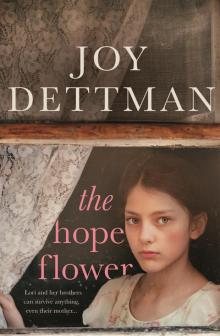 The Hope Flower
The Hope Flower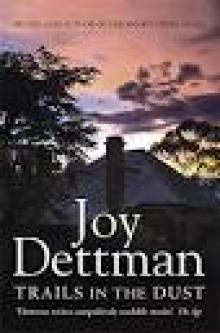 Trails in the Dust
Trails in the Dust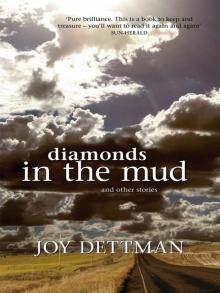 Diamonds in the Mud and Other Stories
Diamonds in the Mud and Other Stories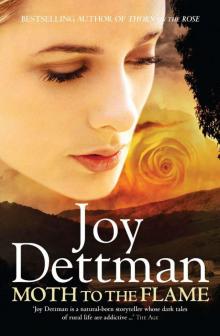 Moth to the Flame
Moth to the Flame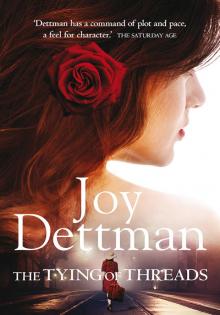 The Tying of Threads
The Tying of Threads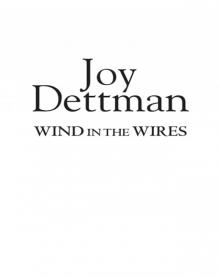 Wind in the Wires
Wind in the Wires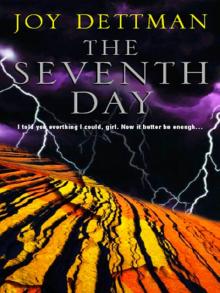 The Seventh Day
The Seventh Day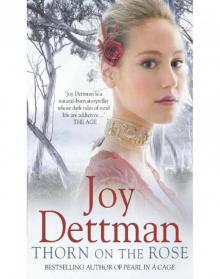 Thorn on the Rose
Thorn on the Rose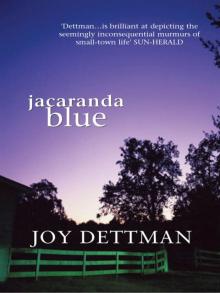 Jacaranda Blue
Jacaranda Blue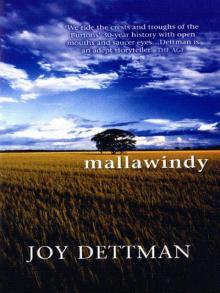 Mallawindy
Mallawindy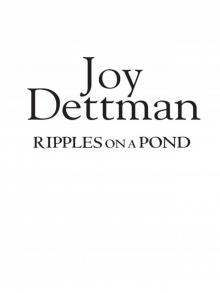 Ripples on a Pond
Ripples on a Pond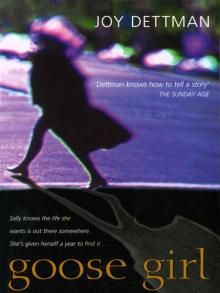 Goose Girl
Goose Girl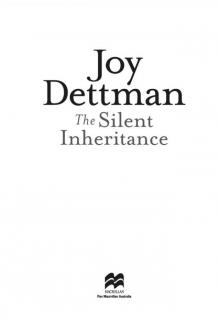 The Silent Inheritance
The Silent Inheritance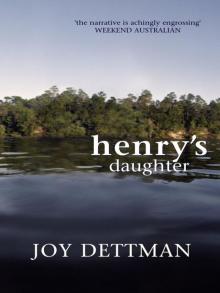 Henry’s Daughter
Henry’s Daughter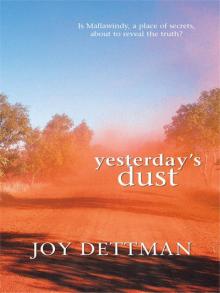 Yesterday's Dust
Yesterday's Dust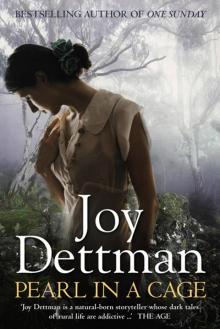 Pearl in a Cage
Pearl in a Cage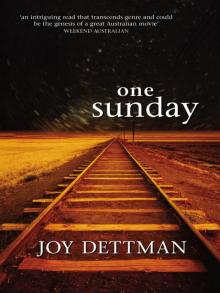 One Sunday
One Sunday